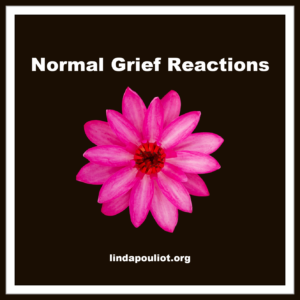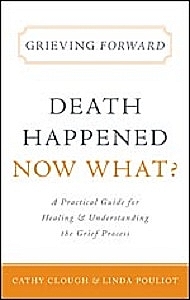
Normal Grief Reactions
Normal grief reactions occur after the death of a loved one and after other types of loss. Life Events That Can Trigger Loss Important to note is that we don’t go looking for these reactions and we don’t get to pick which ones we want—they just show up. The intensity of emotional pain and upheaval that we experience with each reaction is an individual experience. Also important to note is that we don’t all experience the same reactions. Or the same intensity of emotional pain or upheaval. Some people experience a few of the reactions on the list and others of us deal with more. And some people come up with their own list.
Here’s The Catch
We have to acknowledge and respond to each reaction. Because as we sort out, process and work through and respond to the different reactions that what we are experiencing healing takes place. And healing is the end goal. Let’s take a look at the list.
The List
Physical Reactions
- Deep sighing
- Weakness and fatigue
- Rapid heartbeat
- Increased blood pressure
- Increase in activity
- Decrease in activity
- Muscular tension
- Sleep disturbance
- Decreased resistance to illness
- Weight and appetite change (Hiding food or refusing to eat.)
- Neglect of self-care
- Increase in self-care
- Increased sensory awareness
- Allergy Response: Inhalant/Food/Environmental
Emotional Reactions
- Shock/Disbelief
- Numbness (Without this numbness we would by overwhelmed by the pain. Intensity and duration is an individual experience.)
- Confusion
- Euphoria
- Normal Grief Sadness/Depression (There is a lot to be sad and depressed about.)
- Normal Grief Guilt
- Despair
- Hopelessness
- Helplessness
- Feeling of being lost
- Anger
- Bitterness—vengefulness
- Peacefulness
- Yearning for what is lost
- Fear/Anxiety
- Survivors guilt
Behavioral/Social Reactions
- Looking for what is lost (Examples: Searching through drawers or a child moving from room to room searching for their parent(s).)
- Disorientation to place and time
- Hording or hiding food
- Detached from surroundings
- Withdrawn from friends and activities
- Forgetful (Adults tend to lose car keys and they forget to feed their children…)
- Blameful of others
- Apathetic regarding activities or future
- Preoccupied
- Crying (Tears are a healthy release for stress energy and stress toxins.)
- Seeking solitude (So much to process and sort out.)
- Seeking and providing forgiveness
- Spontaneity
Cognitive/Intellectual Reactions
- Impaired self-esteem (Grief is known for undermining confidence and self-esteem.)
- Impaired ability to concentrate (This makes school and work difficult.)
- Disbelief/denying or avoiding the reality of the loss
- Repeated review/rumination of loss events (Part of acceptance and normal early in grief as we sort out and process not only what happened to our loved one – but what has happened to us.)
- Increase/decrease of dreams
- Hyperactivity
- ADHD link to loss/trauma
- Suicidal thoughts (Get help now!)
- Search to understand the implications of the loss
- Practical needs/problem solving
- Creativity
- Wisdom
Spiritual Reactions
- Emptiness/reason to live challenged
- Destruction of ideals/beliefs
- Search for meaning/connectedness
- Spiritual connectedness
- Pessimism or connectedness, wholeness, rebirth,
- Compassion
- Reevaluation of beliefs
Other
- Tattoos, Teen pregnancy—replacing what is lost. Medicating with drugs, alcohol, and/or food.
Integration and Acceptance
Normal grief reactions are normal. Integration of the loss and acceptance of the loss work together as we respond to and work through each reaction that we are experiencing. And this is an ongoing process. With each baby step of integration there is a little bit more acceptance of the loss. With each baby step of acceptance there is a little bit more integration of the loss. Healing is an ongoing process and each of us heals in our own way and on our own personal healing timetable.

